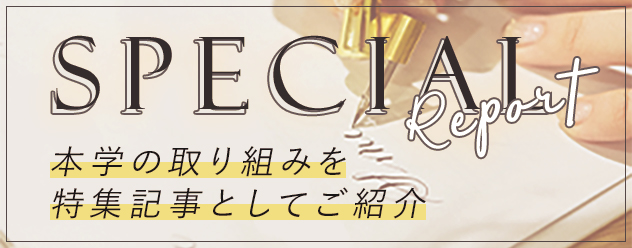Recommendations for the teaching profession  Why did you want to become a teacher?
Why did you want to become a teacher?
What is rewarding about it?
Teikyo University, where he became a teacher
I talked to some graduates.
Why did you want to become a teacher?
When were you a student?
Why don't you try it?
The 1st installment of "Recommendations for Teaching," which introduces Teikyo University's efforts under the theme of "How to become a teacher."
In this second installment, we interviewed two graduates who are active as teachers at Teikyo University group schools.
What kind of thoughts did the two of you, who are in the same generation, aim to be teachers, and what did you do to become them?
I asked my teacher at my school to answer a question that I'm curious about, but it's hard to ask.
-
 平澤 賢也さん 2013年、教育学部初等教育学科初等教育コース卒業、小学校教諭一種、特別支援学校教諭一種取得
平澤 賢也さん 2013年、教育学部初等教育学科初等教育コース卒業、小学校教諭一種、特別支援学校教諭一種取得
2017年、帝京大学小学校入職、現在第6学年、理科、ICT教育担当 -
 秋本 恭誓さん 2013年、教育学部初等教育学科初等教育コース卒業、小学校教諭一種、特別支援学校教諭一種取得
秋本 恭誓さん 2013年、教育学部初等教育学科初等教育コース卒業、小学校教諭一種、特別支援学校教諭一種取得
2017年、帝京大学小学校入職、第5学年、算数、特別活動担当
(Honorifics omitted below)
Q.01What made you want to become a teacher?

- Pyeongtaek
When I was in middle school, my relatives and friends began to tell me that I might be suitable for being a teacher, and that's when I started to get interested.

- Akimoto
I also became interested in the profession of a teacher around junior high school.

- Pyeongtaek
By the time I was in high school, I was already interested in it, and I experienced volunteering at a special support school.

- Akimoto
-
I am also a volunteer.
When I was in high school, I used to play with elementary school students once or twice a month during breaks.
I felt like an "older brother".
Q.02 both of you volunteer
I have experienced
What left an impression on you?

The original experience as a volunteer pushes the path after that.

- Pyeongtaek
Although it was only a short week, I was able to see the growth of the children, such as being able to use the toilet on their own.

- Akimoto
-
I had the experience that when I taught the upside-down, a child who couldn't do it before became able to do it. I thought, "This is what a teacher should do." It was at this time that I began to seriously aspire to become a teacher because I wanted to be by my side and support the growth of my children.
Q.03 in 2013
Entered Teikyo University.
What do you remember from class?

- Pyeongtaek
-
I had a hard time with the mock class! Students create their own teaching plan from scratch and give mock lessons to everyone in the class. It takes about 10 minutes, but I spent hours practicing.
I remember worrying about how to write a lesson plan, how to proceed with classes, and how to choose teaching materials.
That's why I was happy to get a good reaction from everyone in the class.

- Akimoto
-
I also had experience volunteering while I was in college.
I still remember the fact that I used marbles to teach math to children who were behind in learning.

- Pyeongtaek
-
I also have experience as a volunteer. I used to visit Teikyo University Elementary School, where I currently work, about once a week when there were no lectures.
It was a lot of fun to participate in learning volunteers for lower grades, and I thought, "After all, it's nice to be a teacher."

- Akimoto
-
When I think about it now, I think I learned a lot of things at university that would be useful when teaching children.
For example, in the "Theory and Practice" class, I was taught that "children don't follow textbooks."
During the week of summer vacation, I enjoyed watching the children grow day by day during the observation training.
A seminar where I learned to think critically without failing to take what I was told or written down into consideration—critical thinking is my current educational policy.I wanted to know more about the world outside of the teacher training course, so I took courses in business administration and economics.

Children don't follow textbooks!
Q.04Do you have memories of university life outside of classes?

- Akimoto
-
Belongs to the athletics track and field club and competes with friends in the 110m hurdles.
I also love traveling, and have traveled to various places both domestically and internationally, such as the Tohoku and Sanin regions, Asia, and Europe.It is very helpful now. Children really like listening to their teachers talk outside of class. Showing children pictures of trips they took in college and introducing local foods can be an opportunity to draw out their interest. When I talk about the setbacks I experienced in my competitive life and the experiences I had to switch and move forward, everyone listens seriously.

- Pyeongtaek
-
I can say that. It's not wide and shallow, but I feel that it's better to have as many drawers as you want.
When I was in school, I was also passionate about various things, such as fishing, traveling, games, anime, computers, music, and part-time jobs, and I found it useful when I interacted with children. For example, when I talk about part-time jobs, they are interested in me because they have no work experience, and I can talk about common topics with children who are fishing or who are interested in computers.



Q.05It has been five years since you joined the company.
What do you think now that you have become a teacher?

One of the charms of the faculty is that they continue to interact with each other even after graduation .

- Pyeongtaek
-
It's been 5 years since I joined the company, but I'm still learning every day. Especially the 6th graders I'm in charge of are like half-adults. For such children, for example, if there is a child who is not getting along with his friends, how should we guide him/her? I'm worried.
In the first place, when teaching, you can't use words that are too harsh, but if you are too kind, they won't listen, so I pay attention to every single word. it's difficult. I still do trial and error every day.

- Akimoto
-
It is true that being a teacher can be difficult at times. But I am happy to be involved in the growth of children every day. There are children who can't do something like studying or exercising, but I teach them so that they can do it.
When I meet such a moment, I feel great joy, just like volunteering in high school or observing practice at university.
Also, even after graduating, some children keep in touch with me saying things like, "I got this kind of grades in junior high school," or, "I'm doing my best to do this now."
It may be unique to the teacher that the relationship does not end once you leave the nest.
Q.06Finally , what is the charm of your teacher?

- Pyeongtaek
-
As I said earlier, being a teacher is difficult. But it's still fun. I especially enjoy working with children. Whether in class or during breaks, the time you spend with your children is irreplaceable.
I don't think work will last if you don't think it's fun. I really enjoy my job as a teacher.

- Akimoto
-
In the first place, I don't think it's quite possible to witness the growth of children. Moreover, you can witness the growth of different children every year. I don't think even parents can do that, so I think I'm getting a lot of benefits.
One year really goes by so fast. I think I'm probably getting old in no time (laughs).

Both of them seem to have felt the reward of being a teacher through the opportunity to interact with children during their university days.
Teikyo University is promoting cooperation with group kindergartens and elementary schools, so there is an environment where children can come into direct contact with them from an early age. In addition, Hachioji Campus not only houses Faculty of Education, but also provides counseling and guidance to students who aim to become teachers, mainly at the Center for Teacher Education. In addition, the computerized "Student Portfolio" and "Teaching Profession Record" allow students and faculty members to understand each other's learning status, providing full support for students aiming to become teachers.
 The two people I talked to this time also used About the Teacher Training Center
The two people I talked to this time also used About the Teacher Training Center
The Teacher Training Center is a comprehensive support center where students aiming to become teachers or obtain teaching qualifications can receive consultation and guidance at any time.
We also hold an "Alumni Teaching Association" that brings together current students and alumni who have graduated from our university and are now working in the field of education.
Message
can learn deeply about education
"Teaching Course"
Not only for those who aim to become teachers
For those interested in education-related companies and services
very
It will be a very meaningful experience.
At Teikyo University, with friends who have the same goals
Why don't we learn together?



